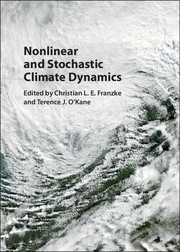Book contents
- Frontmatter
- Contents
- List of Figures
- List of Contributors
- Preface
- 1 Challenges for Ice Age Dynamics: A Dynamical Systems Perspective
- 2 Tipping Points in the Climate System
- 3 Atmospheric Teleconnection Patterns
- 4 Atmospheric Regimes: The Link between Weather and the Large-Scale Circulation
- 5 Low-Frequency Regime Transitions and Predictability of Regimes in a Barotropic Model
- 6 Complex Network Techniques for Climatological Data Analysis
- 7 On Inference and Validation of Causality Relations in Climate Teleconnections
- 8 Stochastic Climate Theory
- 9 Stochastic Subgrid Modelling for Geophysical and Three-Dimensional Turbulence
- 10 Model Error in Data Assimilation
- 11 Long-Term Memory in Climate: Detection, Extreme Events, and Significance of Trends
- 12 Fractional Stochastic Models for Heavy Tailed, and Long-Range Dependent, Fluctuations in Physical Systems
- 13 Modelling Spatial Extremes Using Max-Stable Processes
- 14 Extreme Value Analysis in Dynamical Systems: Two Case Studies
- Index
11 - Long-Term Memory in Climate: Detection, Extreme Events, and Significance of Trends
Published online by Cambridge University Press: 26 January 2017
- Frontmatter
- Contents
- List of Figures
- List of Contributors
- Preface
- 1 Challenges for Ice Age Dynamics: A Dynamical Systems Perspective
- 2 Tipping Points in the Climate System
- 3 Atmospheric Teleconnection Patterns
- 4 Atmospheric Regimes: The Link between Weather and the Large-Scale Circulation
- 5 Low-Frequency Regime Transitions and Predictability of Regimes in a Barotropic Model
- 6 Complex Network Techniques for Climatological Data Analysis
- 7 On Inference and Validation of Causality Relations in Climate Teleconnections
- 8 Stochastic Climate Theory
- 9 Stochastic Subgrid Modelling for Geophysical and Three-Dimensional Turbulence
- 10 Model Error in Data Assimilation
- 11 Long-Term Memory in Climate: Detection, Extreme Events, and Significance of Trends
- 12 Fractional Stochastic Models for Heavy Tailed, and Long-Range Dependent, Fluctuations in Physical Systems
- 13 Modelling Spatial Extremes Using Max-Stable Processes
- 14 Extreme Value Analysis in Dynamical Systems: Two Case Studies
- Index
Summary
Abstract
This review is devoted to long-term memory in climate variability. Several methods for detecting long-term memory, also in the presence of polynomial external trends, are discussed. It is shown how the occurrence of rare events can be quantified in long-term correlated records and how this can be effectively used in risk estimation. In addition, it is shown how the significance of trends can be estimated in long-term correlated records. The results are applied to observational data, paleo data and model data.
Introduction
In recent years, there is growing evidence that hydroclimate data like river flows (Hurst, 1951, Mandelbrot and Wallis, 1968, Tessier et al., 1996, Montanari et al., 2000, Montanari, 2003, Koutsoyiannis, 2003, 2006, Kantelhardt et al., 2006, Koscielny-Bunde et al., 2006, Mudelsee, 2007, Livina et al., 2003), atmospheric and sea surface temperatures (Mandelbrot, 2001, Bloomfield and Nychka, 1992, Koscielny-Bunde et al., 1996, Pelletier and Turcotte, 1997, Koscielny-Bunde et al., 1998, Malamud and Turcotte, 1999, Talkner and Weber, 2000, Weber and Talkner, 2001, Monetti et al., 2003, Eichner et al., 2003, Fraedrich and Blender, 2003, Blender and Fraedrich, 2003, Gil-Alana, 2005, Cohn and Lins, 2005, Király et al., 2006, Rybski et al., 2006, 2008, Zorita et al., 2008, Giese et al., 2007, Rybski and Bunde, 2009, Halley, 2009, Lennartz and Bunde, 2009b, Fatichi et al., 2009, Franzke, 2010, Lennartz and Bunde, 2011, Franzke, 2012, Lovejoy and Schertzer, 2013, Franzke, 2013, Bunde et al., 2014, Yuan et al., 2014, Ludescher et al., 2015, Yuan et al., 2015), sea level heights (Beretta et al., 2005, Dangendorf et al., 2014, Becker et al., 2014), or wind fields (Santhanam and Kantz, 2005) and mid-latitude cyclones (Blender et al., 2015) exhibit long-term persistency. In previous reports of the Intergovernmental Panel on Climate Change (IPCC) (see, e.g. [Stocker et al., 2013]) it had been anticipated that only short-term persistency occurs. In long-term persistent data sets the autocorrelation function decays algebraically, without a characteristic time scale, while in short-term persistent data sets, in contrast, the autocorrelation function decays exponentially and there is a characteristic time scale above which the data can be considered as independent.
- Type
- Chapter
- Information
- Nonlinear and Stochastic Climate Dynamics , pp. 318 - 339Publisher: Cambridge University PressPrint publication year: 2017
- 6
- Cited by



